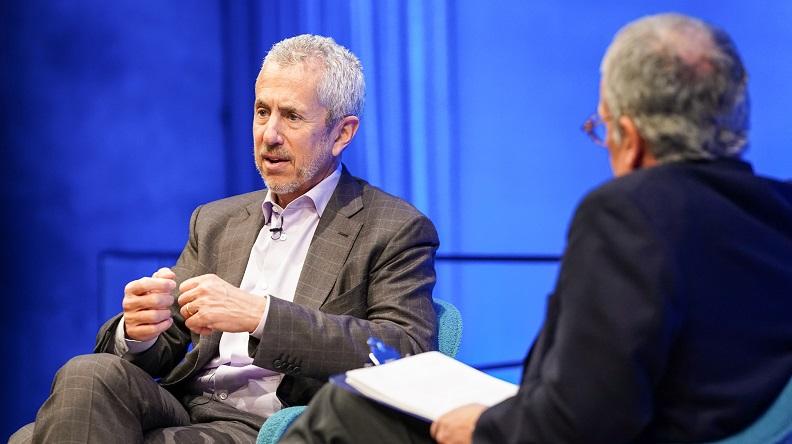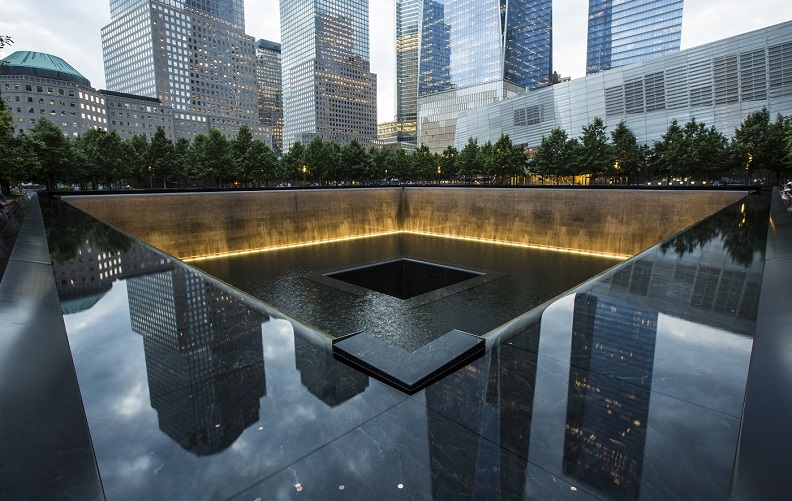Make a donation to the Museum
Danny Meyer Reflects on 9/11, Restaurants as Sites of Community and Connection in Public Program
Danny Meyer Reflects on 9/11, Restaurants as Sites of Community and Connection in Public Program

Last week, celebrated New York City restaurateur Danny Meyer participated in a public program at the 9/11 Memorial Museum as part of the “New York Stories” program series.
In conversation with Cliff Chanin, executive vice president and deputy director for museum programs, Meyer talked about his memories of September 11, 2001, and the day’s impact on the city.
Meyer, whose past and present portfolio includes classic New York City eateries such as Union Square Café, Eleven Madison Park, and Gramercy Tavern as well as the Shake Shack empire, remembers the now late New York Met Rusty Staub finding refuge in Union Square Café on 9/11.
“[Staub] was one of the hundreds and hundreds of people who just trekked uptown – and Union Square Café was the place he wanted to go,” said Meyer. “So he was one of the people who sought comfort there. We had people coming there who had planned to have lunch together and we saw a reunion, where people thought the other one had died because they had come from downtown.”
A highlight clip from the Danny Meyer program. In this clip, Meyer reflects on finding New York Met Rusty Staub taking shelter in Union Square Cafe following the 9/11 attacks.
In the clip below, Meyer talks about the industry-wide initiative to breathe life back into New York City’s restaurant culture after the attacks, which served as a dual mission to heal a devastated city and keep the industry afloat:
“The first thing we had to do was address the emotional notion that you were doing something wrong to eat out. And we basically said that if you don’t spend time with people you love, going out, you will have let the terrorists win, because that’s what they wanted to do, was to disrupt life as we know it. And that the people who died won’t come back to life because you stayed home. And that loving each other and being with each other, human beings being with each other is why restaurants exist. The word hospitality is based on hope, the opposite of fear. And so we had to deal with that emotional issue first. And then we also had to make the economic case that the most patriotic thing you could do and the most civic thing you could do would be to somehow catalyze some type of an uptick in the economy here, because it wasn’t going to do anyone any good to see New York go out of business. And we were then trying to cascade our message to other cities. ‘Please have your meeting here,’ ‘Please show us that you support this city.’ New York was never closer than it was in those days.”
A video highlight clip of the Danny Meyer program at the 9/11 Memorial Museum. In this clip, Meyer reflect upon the restorative role of restaurants following the 9/11 attacks.
View the full program to hear Meyer reflect upon the restorative role of restaurants as sites of community and connection and find out more about the winter/spring 2020 public programming season at the 9/11 Memorial Museum.
By 9/11 Memorial Staff
Previous Post
John O’Neill’s FBI Jacket and Passport Embody His Enduring Fight Against Terrorism
John O’Neill was a leading figure in the FBI’s fight against terrorism at home and abroad in the years leading up to 9/11. He repeatedly sounded the alarm about the rising threat posed by organizations like al-Qaeda—and his life would ultimately be cut short in that group’s plot to attack the World Trade Center.
Next Post
COVID-19 Update: 9/11 Memorial & Museum to Close Temporarily Starting March 13

The 9/11 Memorial & Museum will be temporarily closed starting March 13 as part of the New York City and New York State mandates to combat and contain the COVID-19 virus.